| Listing 1 - 8 of 8 |
Sort by
|
Book
Year: 1978 Publisher: New York : Columbia University Press,
Abstract | Keywords | Export | Availability | Bookmark
 Loading...
Loading...Choose an application
- Reference Manager
- EndNote
- RefWorks (Direct export to RefWorks)
Anthropologists --- Psychiatrists --- Biography. --- Biography. --- Rivers, W. H. R.,
Book
ISBN: 0670828769 Year: 1991 Publisher: London,New York : Viking,
Abstract | Keywords | Export | Availability | Bookmark
 Loading...
Loading...Choose an application
- Reference Manager
- EndNote
- RefWorks (Direct export to RefWorks)
Anthropologists --- Poets, English --- Soldiers --- World War, 1914-1918 --- Fiction. --- Fiction --- Fiction --- Fiction --- Rivers, W. H. R. --- Sassoon, Siegfried, --- Fiction. --- Fiction
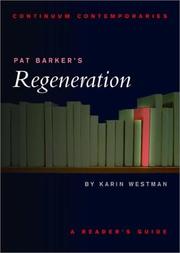
ISBN: 0826452302 9780826452306 Year: 2001 Publisher: New York (N.Y.) : Continuum,
Abstract | Keywords | Export | Availability | Bookmark
 Loading...
Loading...Choose an application
- Reference Manager
- EndNote
- RefWorks (Direct export to RefWorks)
Biographical fiction, English --- World War, 1914-1918 --- History and criticism. --- Literature and the war. --- Barker, Pat. --- Sassoon, Siegfried, --- Rivers, W. H. R. --- In literature. --- Biographical fiction, English - History and criticism. --- World War, 1914-1918 - Great Britain - Literature and the war. --- Barker, Pat. - Regeneration. --- Sassoon, Siegfried, - 1886-1967 - In literature. --- Rivers, W. H. R. - (William Halse Rivers), - 1864-1922 - In literature. --- Sassoon, Siegfried, - 1886-1967 --- Rivers, W. H. R. - (William Halse Rivers), - 1864-1922
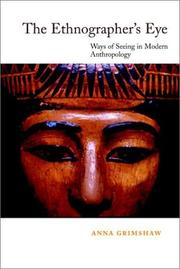
ISBN: 0521774756 0521773105 0511049838 0511817673 0511153406 9780521774758 Year: 2002 Publisher: Cambridge Cambridge University press
Abstract | Keywords | Export | Availability | Bookmark
 Loading...
Loading...Choose an application
- Reference Manager
- EndNote
- RefWorks (Direct export to RefWorks)
Grimshaw's exploration of the role of vision within modern anthropology engages with current debates about ocularcentism, investigating the relationship between vision and knowledge in ethnographic enquiry. Using John Berger's notion of 'ways of seeing', the author argues that vision operates differently as a technique and theory of knowledge within the discipline. In the first part of the book she examines contrasting visions at work in the so-called classical British school, reassessing the legacy of Rivers, Malinowski and Radcliffe-Brown through the lens of early modern art and cinema. In the second part of the book, the changing relationship between vision and knowledge is explored through the anthropology of Jean Rouch, David and Judith MacDougall, and Melissa Llewelyn-Davies. Vision is foregrounded in the work of these contemporary ethnographers, focusing more general questions about technique and epistemology whether image-based media are used or not in ethnographic enquiry.
#SBIB:39A8 --- Antropologie: linguïstiek, audiovisuele cultuur, antropologie van media en representatie --- Anna Grimshaw --- film en etnografie --- visuele antropologie --- Rivers W.H.R. --- Flaherty Robert --- Grierson John --- MacDougall David --- MacDougall Judith --- Llewelyn-Davies Melissa --- Visual anthropology. --- Visual anthropology --- Ethnology --- 391 --- 791.41 --- 791.43 --- antropologie --- documentaire --- etnografie --- film --- filmgeschiedenis --- filmtheorie --- Griffith David Wark --- kubisme --- kunst --- modernisme --- Rivers W.H.R --- Rouch Jean --- twintigste eeuw --- Social Sciences --- Anthropology
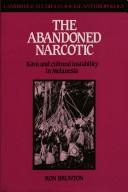
ISBN: 0521373751 0521040051 0511557957 Year: 1989 Publisher: Cambridge : Cambridge University Press,
Abstract | Keywords | Export | Availability | Bookmark
 Loading...
Loading...Choose an application
- Reference Manager
- EndNote
- RefWorks (Direct export to RefWorks)
Ron Brunton revives a problem posed by the great anthropologist W. H. R. Rivers in History of Melanesian Society (1914): how to explain the strange geographical distribution of kava, a narcotic drink once widely consumed by south-west Pacific islanders. Rivers believed that it was abandoned by many people even before European contact in favour of another drug, betel, drawing his speculations from the ideas of the diffusionist school of anthropology. However, Dr Brunton disagrees. Taking the varying fortunes of kava on the island of Tanna, Vanauta, as his starting point, he suggests that kava's abandonment can best be explained in terms of its association with unstable religious cults, and not because of the adoption of betel. The problem of kava is therefore part of a broader problem of why many traditional Melanesian societies were characteristically highly unstable, and Dr Brunton sees this instability as both an outcome and a cause of weak institutions of authority and social coordination.
Kava (Beverage) --- Kava ceremony --- Tanna (Ni-Vanuatu people) --- Drug use. --- Social conditions. --- Social Sciences --- Anthropology --- Tanna (Vanuatu people) --- Tanna (Vanuatuan people) --- Tannese (Ni-Vanuatu people) --- Ethnology --- Melanesians --- Drinking customs --- Ava (Beverage) --- Cava (Beverage) --- Kaava --- Kawa --- Yagona --- Beverages --- Rivers, W. H. R. --- Rivers, William Halse Rivers,
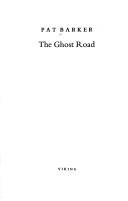
ISBN: 0670854891 Year: 1995 Publisher: London Viking
Abstract | Keywords | Export | Availability | Bookmark
 Loading...
Loading...Choose an application
- Reference Manager
- EndNote
- RefWorks (Direct export to RefWorks)
World War, 1914-1918 --- -Psychiatrists --- -Soldiers --- -Poets --- -War neuroses --- -Shell shock --- Traumatic neuroses --- Military psychiatry --- Authors --- Armed Forces personnel --- Members of the Armed Forces --- Military personnel --- Military service members --- Service members --- Servicemen, Military --- Armed Forces --- Alienists --- Psychopathologists --- Mental health personnel --- Physicians --- Neurologists --- European War, 1914-1918 --- First World War, 1914-1918 --- Great War, 1914-1918 --- World War 1, 1914-1918 --- World War I, 1914-1918 --- World War One, 1914-1918 --- WW I (World War, 1914-1918) --- WWI (World War, 1914-1918) --- History, Modern --- Fiction --- Owen, Wilfred --- -Rivers, W. H. R. --- -Fiction --- Great Britain --- Fiction. --- Poets --- Psychiatrists --- Soldiers --- War neuroses --- Shell shock --- Owen, Wilfred, --- Rivers, W. H. R. --- Rivers, William Halse Rivers, --- Oʼen, Ṿilfred, --- אואן, וילפרד, --- Оуэн, Уилфред, --- Ouėn, Uilfred, --- Owen, Wilfred Edward Salter --- Oʼen, Ṿilfred --- Оуэн, Уилфред --- Ouėn, Uilfred --- 870 --- Booker prize --- proza --- prose
Book

ISBN: 9781782383420 1782383425 9781782383437 9781785333392 1785333399 1782383433 Year: 2014 Publisher: New York Oxford
Abstract | Keywords | Export | Availability | Bookmark
 Loading...
Loading...Choose an application
- Reference Manager
- EndNote
- RefWorks (Direct export to RefWorks)
In 1908, Arthur Maurice Hocart and William Halse Rivers Rivers conducted fieldwork in the Solomon Islands and elsewhere in Island Melanesia that served as the turning point in the development of modern anthropology. The work of these two anthropological pioneers on the small island of Simbo brought about the development of participant observation as a methodological hallmark of social anthropology. This would have implications for Rivers' later work in psychiatry and psychology, and Hocart's work as a comparativist, for which both would largely be remembered despite the novelty of that inde
Ethnology --- Anthropologie sociale et culturelle --- Rivers, W. H. R. --- Hocart, A. M. --- Travel --- Particpant observation --- Hocart, Arthur Maurice, --- Rivers, William Halse Rivers, --- Solomon Islands --- #SBIB:303H31 --- #SBIB:39A2 --- #SBIB:39A76 --- Cultural anthropology --- Ethnography --- Races of man --- Social anthropology --- Anthropology --- Human beings --- Fieldwork --- History --- Kwalitatieve methoden: sociale en culturele antropologie --- Antropologie: methoden en technieken --- Etnografie: Oceanië --- Iles Salomon --- Iye Shelomoh --- Solomons --- Islas Salomón --- So-lo-men chʻün tao --- So-lo-men tao --- So-lo-men --- British Solomon Islands --- Social life and customs. --- Participant observation --- Participant research --- Participatory research --- Observation (Psychology) --- Social sciences --- History. --- Fieldwork. --- Rivers, W. H. R.-(William Halse Rivers),-1864-1922-Travel-Solomon Islands. --- Ethnology-Solomon Islands-History. --- Ethnology-Solomon Islands-Fieldwork. --- Particpant observation-Solomon Islands. --- Solomon Islands-Social life and customs.
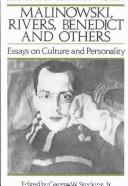
ISBN: 1282643177 9786612643170 0299107337 9780299107338 9781282643178 0299107302 9780299107307 0299107345 9780299107345 661264317X Year: 1986 Volume: 4 Publisher: Madison (Wis.): University of Wisconsin press
Abstract | Keywords | Export | Availability | Bookmark
 Loading...
Loading...Choose an application
- Reference Manager
- EndNote
- RefWorks (Direct export to RefWorks)
History of Anthropology is a series of annual volumes, inaugurated in 1983, each of which treats a theme of major importance in both the history and current practice of anthropological inquiry. Drawing its title from a poem of W.H. Auden's, the present volume, Malinowski, Rivers, Benedict, and Others (the fourth in the series) focuses on the emergence of anthropological interest in "culture and personality" during the 1920s and 1930s. It also explores the historical, cultural, literary, and biological background of major figures associated with the movement, including Bronislaw Manlinowski, Edward Sapir, Abram Kardiner, Ruth Benedict, Margaret Mead, and Gregory Bateson. Born in the aftermath of World War I, flowering in the years before and after World War II, severely attacked in the 1950s and 1960s, "culture and personality" was subsequently reborn as "psychological anthropology." Whether this foreshadows the emergence of a major anthropological subdiscipline (equivalent to cultural, social, biological, or linguistic anthropology) from the current welter of "adjectival" anthropologies remain to be seen. In the meantime, the essays collected in the volume may encourage a rethinking of the historical roots of many issues of current concern. Included in this volume are the contributions of Jeremy MacClancy, William C. Manson, William Jackson, Richard Handler, Regna Darnell, Virginia Yans-McLaughlin, James A. Boon, and the editor.
Ethnopsychology --- Personality and culture. --- Cross-cultural psychology --- Ethnic groups --- Ethnic psychology --- Folk-psychology --- Indigenous peoples --- National psychology --- Psychological anthropology --- Psychology, Cross-cultural --- Psychology, Ethnic --- Psychology, National --- Psychology, Racial --- Race psychology --- Psychology --- National characteristics --- Civilization and personality --- Culture and personality --- Civilization --- Culture --- History. --- Personality and culture --- Personnalité et culture --- Ethnopsychologie --- History --- Histoire --- Benedict, Ruth, --- Malinowski, Bronislaw, --- Rivers, W. H. R. --- Rivers, William Halse Rivers, --- Malinowski, Bronislaus, --- Malinowski, B. --- Malinovski, Bronislav, --- Malinovskiĭ, Bronislav, --- מלינובסקי, ברוניסלב, --- Benedict, Ruth Fulton --- ベネディクト, ルース
| Listing 1 - 8 of 8 |
Sort by
|

 Search
Search Feedback
Feedback About UniCat
About UniCat  Help
Help News
News